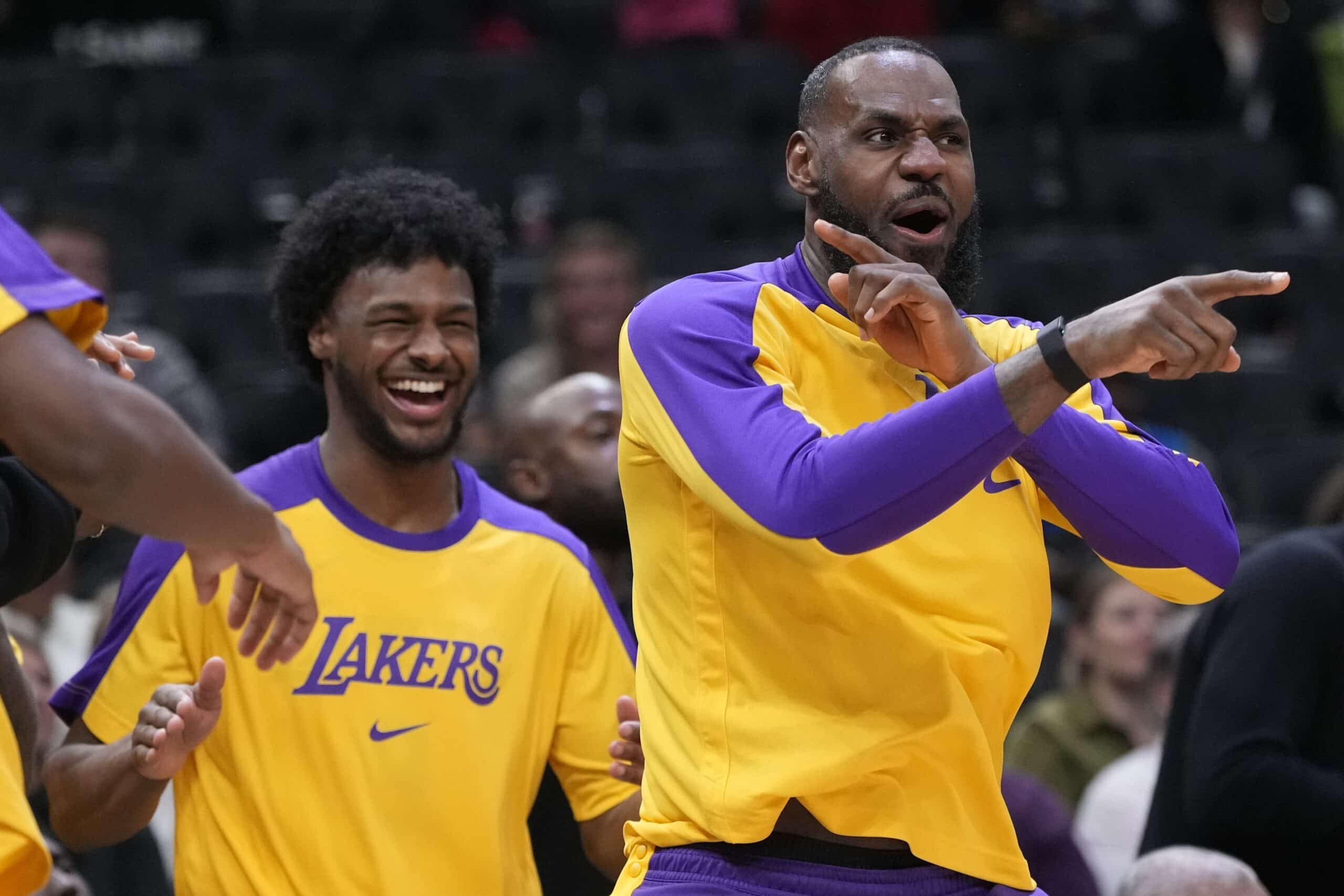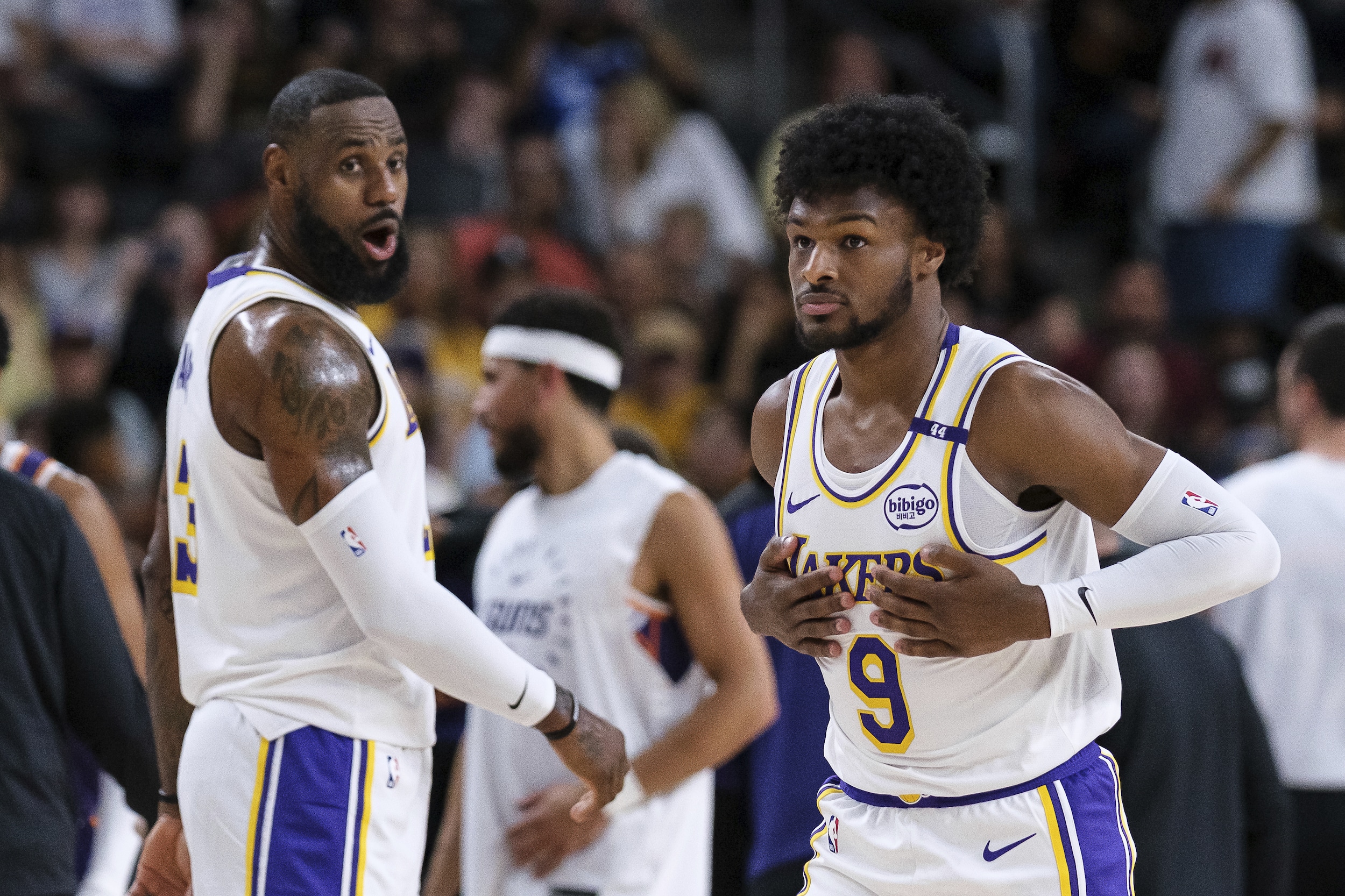
Los Angeles Lakers’ LeBron James and Bronny James react on the bench during the second half of an NBA preseason basketball game against the Milwaukee Bucks Thursday, Oct. 10, 2024, in Milwaukee. (AP Photo/Morry Gash)
LeBron James stood on the court next to his son Bronny and couldn’t help but glance over at him to take in the moment. The duo wore matching Los Angeles Lakers jerseys with “James” and “James Jr.” embroidered in big purple letters on their backs.
“It was like the matrix or something,” LeBron said afterward. “It just didn’t feel real.”
Article continues after this advertisement
The Lakers helped the 39-year-old James realize a yearslong dream of playing alongside his son when they drafted Bronny with the 55th overall pick in June, making way for them to become the first father-son pair to play in an NBA game together in a preseason matchup on Oct. 6.
READ: Bronny James hails ‘new beginnings’ in NBA preseason debut
Lakers general manager Rob Pelinka has described the draft pick as “magical,” while his organization has drawn criticisms about whether Bronny would have earned the opportunity if his father wasn’t one of the game’s greatest players. Those objections—albeit met with widespread excitement for the James family—reignited conversations about nepotism in sports and how powerful figures leverage their influence, while underscoring the stigma around kids following in the footsteps of a successful parent or family member.
Article continues after this advertisement
“There’s always going to be people who are saying that things are nepotism,” said Alice Leppert, an associate professor of media and communication studies at Ursinus College in Pennsylvania. “There’s going to be some cynical assumption that strings were pulled and basically that things are not fair.”
READ: LeBron, Bronny James play together as Lakers for first time
That’s often based on people’s desire to believe in a meritocracy, Leppert said, referring to the system where someone gains status or rewards based on their abilities, not wealth or social status.
“In general, we don’t live in a meritocracy,” Leppert added. “We want to live in a meritocracy, and that’s why we get these sorts of debates.”
Critics of nepotism argue that those without the same access to resources—i.e., producers and directors in the entertainment industry, scouts and training facilities in sports—are left at a significant disadvantage when it comes to opportunities.
100 instances

Los Angeles Lakers guard Bronny James (9), right, steps onto the court with Los Angeles Lakers forward LeBron James (23) during the first half of a preseason NBA basketball game Sunday, Oct. 6, 2024, in Palm Desert, Calif. (AP Photo/William Liang)
Others question why a practice so ingrained in society is being even mentioned.
“I don’t want to hear these charges, people talking about nepotism,” former ESPN NBA insider Adrian Wojnarowski said during the NBA draft. “The NBA is full of nepotism. The ownership level, front offices, coaching. I don’t want to hear it all of a sudden because Bronny James’ father plays for the Lakers. It is rampant in this league.”
READ: NBA: Lakers ponder when LeBron will share court with son Bronny
There have been about 100 instances in NBA history of players joining the league after their fathers played. Those young men stepped into the league after their fathers’ careers ended, but they include Stephen and Dell Curry, Kobe and Joe “Jellybean” Bryant, Bill and Luke Walton, among others.
“I think we’re resigned in this country to the fact that if you own it, you can do whatever you want with it,” said David Grenardo, a law professor and sports law expert at the University of St. Thomas in Minnesota. “So I’m the owner. I can pass it down to my kids … And that’s somewhat acceptable because that person has the right to do with their property what they want.”
That acceptance changes when it comes to athletes, Grenardo said.
“That is where we are completely uncomfortable with the idea of someone getting an opportunity that they did not deserve,” he said. “So then when you have a situation where someone who may not be perceived as the best is getting an opportunity over someone else … now it becomes, ‘Well, whose kid is that?’” Grenardo said.

